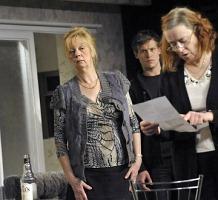In Basildon
As I worked in Basildon for what seemed almost like a life sentence, the prospect of watching a play about this Essex town, once dubbed 'Little Moscow down the Thames' because of its (then) socialist sympathies, sent an unnerving shiver of foreboding down my spine. My experiences of teaching in a tough comprehensive school in an area populated by largely working-class families left me with mixed emotions about the people and the town itself. Once an area developed on an ad-hoc basis by London's eastenders who sought a better life and better homes, much of the town had been built on an ad-hoc kind of basis until, after the Second World War, the area was developed as a New Town, to which people were shipped-out from London en masse.
When we join David Eldridge's new play, we find ourselves in the living room of a neat, semi-detached house. Len and his sister Doreen have lived together in this house for a considerable time. Doreen is now looking after her brother who is dying of cancer. Len's hospital-style bed sits in the middle of the room dominating the space. At the beginning of the play, Len's other sister Maureen arrives. Immediately there is hostility and tension in the air as Doreen and Maureen have not spoken to each other for 20 years. Also assembled in the last moments of Len's life are Barry and Len's long-time pal Ken. And a neighbour, Pam, busies herself making tea and the like before she is banished rather abruptly and thoughtlessly back to her home next door by Doreen.
The humour begins from the very first spoken words when Maureen arrives. "Hello Maureen," says Doreen. "Hello Doreen" replies Maureen. And from thereon in, we have three acts peppered with very funny remarks, some of which are rather earthy and not a little risqué. In spite of Len being close to death, there's considerable banter between Barry and Ken.
Linda Bassett's harsh, unforgiving Doreen is well-contrasted with Ruth Sheen's somewhat gentler, less hostile Maureen in Dominic Cooke's well-directed production. But both sisters ably and convincingly convey their seething, barely controlled animosity towards each other. Doreen says she hates her sister, and Maureen says there will be a 'reckoning' but they nonetheless pointedly call each other 'darling'. Lee Ross's Barry is pressured by his coarse wife Jackie (Debbie Chazen) who needs him to 'give her one' in spite of his grief as she is ovulating and they are trying to start a family. Barry is also pressured by his inability to cope with the demands of business life - he is in trouble with the 'VAT man' - and he longs to have his own home, even though he and Jackie have just moved into a new council flat. Peter Wight is excellently cast as the affable friend who really is an additional member of the family and seems to have all the answers about Len's wishes in terms of both his 'end of life plan' and his funeral.
In the final act, a flashback sequence rewinds the clock 18 years to happier times when Maur and Dor (as everyone affectionately calls the two sisters) and a much younger Len were all the best of friends. Though this act clarifies how the warring sisters managed to fall-out - something which had been gnawing away at most of us throughout the previous three acts - it strangely became rather sluggish, lack-lustre and banal, certainly in comparison with what had gone before. Though I can see that Mr Eldridge needed to make a gear change to round-off and complete his story, it provided a rather bland anti-climax to what, up to that point, had been a well-observed and wittily enjoyable piece that certainly provoked flashbacks of my own.
(Peter Brown)
"Cooke's production, intimately staged in the round, is finely crafted."
Henry Hitchings for the Evening Standard
"Gloriously rich, humorous, agonising and politically provocative play, but it has been staged by the Royal Court's artistic director, Dominic Cooke, in a bafflingly peculiar, not to say, counterproductive way."
Paul Taylor for The Independent
"Fine new piece by David Eldridge...What makes In Basildon such a success, though, is Eldridge's sharp and witty ear for demotic dialogue, and a cracking plot. "
Charles Spencer for The Daily Telegraph
"This richly observant play is given a near-perfect production by Dominic Cooke who, with designer Ian MacNeil, restructures the Court so that the audience, like the family, is divided in two."
Michael Billington for The Guardian
External links to full reviews from popular press
Independent - Telegraph - Guardian
Originally published on
